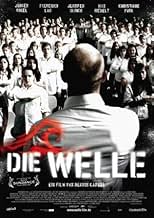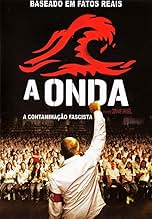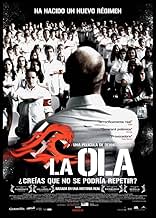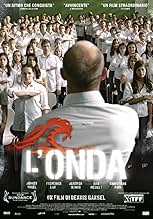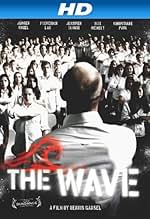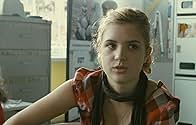Un professeur de lycée cherche à expliquer à ses élèves ce qu'est la vie sous une dictature. L'expérience tourne mal alors que ses élèves échappent à son contrôle.Un professeur de lycée cherche à expliquer à ses élèves ce qu'est la vie sous une dictature. L'expérience tourne mal alors que ses élèves échappent à son contrôle.Un professeur de lycée cherche à expliquer à ses élèves ce qu'est la vie sous une dictature. L'expérience tourne mal alors que ses élèves échappent à son contrôle.
- Réalisation
- Scénario
- Casting principal
- Récompenses
- 9 victoires et 8 nominations au total
Avis à la une
"Die Welle" is an above average classroom drama with a political voice. Helmed by director Dennis Gansel, film is unforgiving in depicting the youth as a generation without anything to rebel about but loneliness, making them sensitive to any sort of illusion of belonging. Mostly a riveting affair, film lags in its second act as it jumps into Dawson's Creek. Film goes ashore into a memorable finale. Straight forward filming will captivate audiences, along with a pleasing cast.
Project week in a suburban high school entails them to study various forms of government and restriction. Rainer Wenger (Jürgen Vogel), an under-appreciated teacher finds a way in engaging his students. He cleverly manipulates his class to slap them out of apathy and disinterest with tiny minute changes which eventually builds up to a boil. Classroom scenes are stimulating as debates between the students are daring and engrossing writing mention controversial topics that are usually not spoken with lethargy. Film focuses on a group of smart people, highlighting further that what's bound to happen is even more tragic and rings a bell to what can happen out of celluloid..
Inspired by a 1960's social experiment in California documenting how easy it is to influence individuals, film looses track in its middle section as it begins to refocus on the individual lives of the students. Most characters seem to be run in the mill with general high school romance trouble, which would have been interesting but brings nothing new to the table. Stories work better as a collective rather than individuals, which further add to the intended effect. Some personalities shine though: students who never had any sense of belonging are indeed looked at with much heartbreak here as this false sense of security is embraced by them, motivating them to go a step further in preserving the society.
Finale is spellbinding as even if it diverts a lot from the actual experiment, it still proves as a necessity to further establish a point. Film parallels to the effect of Third Reich within its members and climax reminds audiences of the Bruno Ganz header "Der Untergang", as it clearly parallels the extent of loyalties that may arise in such occasions. From the get go, death of a character is imminent and even with its shock value, it justifies itself as beyond a plot device.
As an ensemble, the acting here is impermeable as they all deliver solid performances. Vogel especially convey solid work as the teacher. He brings gravity and his semi-bald haircut proves ominous. It's a shame that audiences lose connection to him midway though as he suddenly becomes the background to the melodrama.
German setting of the movie elevates the film's status. It creates this palpable undercurrent, that even with a country that already identifies itself as guilty; it still cannot escape the possibility of anarchy. Even if the picture becomes stern with its themes, it still is digestible to the mainstream. Word of mouth can secure a life outside the tills.
Project week in a suburban high school entails them to study various forms of government and restriction. Rainer Wenger (Jürgen Vogel), an under-appreciated teacher finds a way in engaging his students. He cleverly manipulates his class to slap them out of apathy and disinterest with tiny minute changes which eventually builds up to a boil. Classroom scenes are stimulating as debates between the students are daring and engrossing writing mention controversial topics that are usually not spoken with lethargy. Film focuses on a group of smart people, highlighting further that what's bound to happen is even more tragic and rings a bell to what can happen out of celluloid..
Inspired by a 1960's social experiment in California documenting how easy it is to influence individuals, film looses track in its middle section as it begins to refocus on the individual lives of the students. Most characters seem to be run in the mill with general high school romance trouble, which would have been interesting but brings nothing new to the table. Stories work better as a collective rather than individuals, which further add to the intended effect. Some personalities shine though: students who never had any sense of belonging are indeed looked at with much heartbreak here as this false sense of security is embraced by them, motivating them to go a step further in preserving the society.
Finale is spellbinding as even if it diverts a lot from the actual experiment, it still proves as a necessity to further establish a point. Film parallels to the effect of Third Reich within its members and climax reminds audiences of the Bruno Ganz header "Der Untergang", as it clearly parallels the extent of loyalties that may arise in such occasions. From the get go, death of a character is imminent and even with its shock value, it justifies itself as beyond a plot device.
As an ensemble, the acting here is impermeable as they all deliver solid performances. Vogel especially convey solid work as the teacher. He brings gravity and his semi-bald haircut proves ominous. It's a shame that audiences lose connection to him midway though as he suddenly becomes the background to the melodrama.
German setting of the movie elevates the film's status. It creates this palpable undercurrent, that even with a country that already identifies itself as guilty; it still cannot escape the possibility of anarchy. Even if the picture becomes stern with its themes, it still is digestible to the mainstream. Word of mouth can secure a life outside the tills.
How does anyone really portray autocracy and/or fascism? In most ways, it can be done in the usual one-dimensional concoction of corruption, evil deeds, extreme delusion and paranoia amongst the ruling elites of the regimes. The Wave ("Die Welle") though looks at the issue from a different angle, examining how it can arise and entrance those it touches, and in the process makes the whole issue look fresh again.
The basic story is that of a school teacher (an anarchist at heart) who has to teach a class about "Autocracy". Failing to get their attention, he decides to create an experiment whereby they are to create their own mini autocracy and rules amongst themselves (named "The Wave"). With such a controversial subject, the whole thing gets out of hand with the pupils succumbing to the autocratic fascist methodology with grave consequences.
One important point that needs to be added is that its a German movie, and for historical reasons the topic is a delicate one, yet seems to add to the whole feel. The film is quite realistically disturbing in many ways, and shows how most of the pupils slowly fall for fascism in quite innocent ways. It will make you think and possibly reassess the important question, as asked in the film, if Autocracy can rear its head again.
The writing, the acting and direction are excellent. Jürgen Vogel as the class teacher is both entertaining and thoughtful in his role, but the cast in general is exceptional especially as in the main they are mostly teenagers.
If you like thoughtful films, and wish to see something that is questioning historical events in the present, then there is little to better this. Deserves to be watched. Its a film that will definitely be spoken about and re watched by many repeatedly for many years to come.
The basic story is that of a school teacher (an anarchist at heart) who has to teach a class about "Autocracy". Failing to get their attention, he decides to create an experiment whereby they are to create their own mini autocracy and rules amongst themselves (named "The Wave"). With such a controversial subject, the whole thing gets out of hand with the pupils succumbing to the autocratic fascist methodology with grave consequences.
One important point that needs to be added is that its a German movie, and for historical reasons the topic is a delicate one, yet seems to add to the whole feel. The film is quite realistically disturbing in many ways, and shows how most of the pupils slowly fall for fascism in quite innocent ways. It will make you think and possibly reassess the important question, as asked in the film, if Autocracy can rear its head again.
The writing, the acting and direction are excellent. Jürgen Vogel as the class teacher is both entertaining and thoughtful in his role, but the cast in general is exceptional especially as in the main they are mostly teenagers.
If you like thoughtful films, and wish to see something that is questioning historical events in the present, then there is little to better this. Deserves to be watched. Its a film that will definitely be spoken about and re watched by many repeatedly for many years to come.
This movie underlines that man is a social creature. We naturally form groups, groups of friends, of people who like the same music etc. Especially when we are young, belonging to a group is important, it makes our identity, who we are -- as opposed to who everyone else is. And so the teacher in the movie uses what is naturally there, to teach his pupils about autocracy. It shows what happens when you stress that identity, when you stress the sameness, and thus also the otherness of those not belonging to the group. Eventually it shows how easy it is for one, for the group to slip, even without being aware of it. Autocracy isn't dead, it is alive and it is easy. This movie is a must see for everyone, but especially for the young.
This is my fourth German film and I'm digging them. Because you asked, I watched "Das Boot," "Downfall," and "Run Lola Run."
I thought "The Wave" was going to be corny. I thought it was going to be about a group of simple-minded kids following a leader because of some bromides. It wasn't that at all.
Rainer Wenger (Jurgen Vogel) was a teacher who was teaching a class on autocracy for project week. After a spit-fire discussion with the class about what autocracy is Mr. Wenger decided to do an experiment with the class. For project week only they would have to do what Mr. Wenger said. There were a few that resisted and left the class, but those who remained were all in. Slowly, we saw the evolution of a movement.
"The Wave" is the negative side of populism. I say that because the Wave, meaning the organization they formed, could easily have been something good. Mr. Wenger had his students doing very constructive and positive stuff. Who doesn't believe that there's strength in unity, who doesn't believe in equality, who doesn't believe in helping their fellow man? Plenty of organizations, religions, and movements purport similar beliefs and they are viewed as being good. It's when people use these goodly aims to form radical armies bent on purging, "cleansing," or otherwise harming those who don't think like them, that makes a movement into a gang. And if the movement is large enough to engulf an entire nation it becomes an autocracy.
"The Wave" gives food for thought. I think the larger lesson wasn't about being a part of something, I think it was about extremism. That very same group with more moderate participants could easily have been an asset to their school and their community. So I don't knock the Wave for its extremists anymore than I knock a religion for its extremists. Don't throw the baby out with the bath water.
I thought "The Wave" was going to be corny. I thought it was going to be about a group of simple-minded kids following a leader because of some bromides. It wasn't that at all.
Rainer Wenger (Jurgen Vogel) was a teacher who was teaching a class on autocracy for project week. After a spit-fire discussion with the class about what autocracy is Mr. Wenger decided to do an experiment with the class. For project week only they would have to do what Mr. Wenger said. There were a few that resisted and left the class, but those who remained were all in. Slowly, we saw the evolution of a movement.
"The Wave" is the negative side of populism. I say that because the Wave, meaning the organization they formed, could easily have been something good. Mr. Wenger had his students doing very constructive and positive stuff. Who doesn't believe that there's strength in unity, who doesn't believe in equality, who doesn't believe in helping their fellow man? Plenty of organizations, religions, and movements purport similar beliefs and they are viewed as being good. It's when people use these goodly aims to form radical armies bent on purging, "cleansing," or otherwise harming those who don't think like them, that makes a movement into a gang. And if the movement is large enough to engulf an entire nation it becomes an autocracy.
"The Wave" gives food for thought. I think the larger lesson wasn't about being a part of something, I think it was about extremism. That very same group with more moderate participants could easily have been an asset to their school and their community. So I don't knock the Wave for its extremists anymore than I knock a religion for its extremists. Don't throw the baby out with the bath water.
This is a German film (subtitled) about a school project looking at autocracy (a la Nazi Germany). In order for the teacher to persuade his pupils that autocracy remains a real threat to democracy, he persuades them to take part in a class dictatorship. The key difference between this and your average school classroom is that he convinces the pupils not just to obey but also to want his every command. Of course the project turns bad and things get scary.
What I liked about the film was that it did not treat the pupils as "just kids"; they had brains, opinions, and their own ethics too. It is not a very black and white in it's opinion, you could draw some distinct opinion from the film but I suggest that there are several different opinions that are equally as valid. It keeps you guessing what is going to happen & even deliberately misleads you.
What I liked about the film was that it did not treat the pupils as "just kids"; they had brains, opinions, and their own ethics too. It is not a very black and white in it's opinion, you could draw some distinct opinion from the film but I suggest that there are several different opinions that are equally as valid. It keeps you guessing what is going to happen & even deliberately misleads you.
Le saviez-vous
- AnecdotesBased on the novel "The Wave" by Todd Strasser (under the pen name Morton Rhue), a fictionalized account of the "Third Wave" teaching experiment by Ron Jones that took place in a Cubberley High School history class in Palo Alto, California in April 1967.
- GaffesAlthough set somewhere in western Germany, all policemen wear insignia of the state of Berlin.
- Citations
Rainer Wenger: So you don't think there could be another dictatorship in Germany?
Jens: No, we are too enlightened now.
- Crédits fousOpening and closing credits appear as graffiti.
- ConnexionsFeatured in Die Johannes B. Kerner Show: Épisode datant du 12 mars 2008 (2008)
- Bandes originalesRock 'n' Roll High School
Written by Joey Ramone, Johnny Ramone and Dee Dee Ramone
Performed by EL*KE
Produced by Mirko Schaffer
©1980 WB Music Corp. and Taco Tunes
Meilleurs choix
Connectez-vous pour évaluer et suivre la liste de favoris afin de recevoir des recommandations personnalisées
- How long is The Wave?Alimenté par Alexa
Détails
- Date de sortie
- Pays d’origine
- Site officiel
- Langue
- Aussi connu sous le nom de
- La ola
- Lieux de tournage
- Sociétés de production
- Voir plus de crédits d'entreprise sur IMDbPro
Box-office
- Budget
- 5 000 000 € (estimé)
- Montant brut mondial
- 32 350 637 $US
- Durée
- 1h 47min(107 min)
- Couleur
- Mixage
- Rapport de forme
- 2.35 : 1
Contribuer à cette page
Suggérer une modification ou ajouter du contenu manquant





